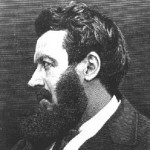A great pleasure in life is doing what people say you cannot do.
Walter Bagehot Quotes
The real essence of work is concentrated energy.
Similar Quotes
I would like my life to be a statement of love and compassion-and where it isn't, that's w...
- Ram DassIf you watch a game, it's fun. If you play it, it's recreation. If you work at it, it's go
- Bob HopeThe artist need not know very much; best of all let him work instinctively and paint as na...
- Emil NoldeI have always had a certain rhythmic approach to my work.
- Paul HirschYou have to stay faithful to what you're working on.
- Stephen KingComments on: "Walter Bagehot Quotes: The real essence of work is concentrated energy."
-
Who can tell without instruction what is likely to be the effect of the new loans of England to foreign nations?We press upon half-finished and half- civilized communities incalculable sums; we are to them what the London money-dealers are to students at Oxford and Cambridge.
Topics in Uncategorized -
Men of business have a solid judgment, a wonderful guessing power of what is going to happen, each in his own trade, but they have never practiced themselves in reasoning out their judgments and in supporting their guesses by argument ; probably if they did so, some of the finer and correcter parts of their anticipations would vanish.
Topics in Uncategorized

| Birth: | 3rd February, 1826 |
| Death: | 24th March, 1877 |
| Nationality: | British |
| Profession: | Businessman, Essayist, Journalist |
Bagehot was born in Langport, Somerset, England. He attended University College London, where he studied mathematics and in 1848 earned a master's degree in intellectual and moral philosophy. In April 1848, Bagehot was sworn as a Special Constable in anticipation of Chartist riots in London.
Bagehot was called to the bar by Lincoln's Inn, but preferred to join his father in 1852 in his family's shipping and banking business. He wrote for various periodicals, and in 1855 founded the National Review with his friend Richard Holt Hutton.[3][4] Later becoming editor-in-chief of The Economist, which had been founded by his father-in-law, James Wilson, in 1860, Bagehot expanded The Economist's reporting on the United States and on politics and is considered to have increased its influence among policymakers over the seventeen years he served as editor.
In 1867, he wrote The English Constitution, a book that explored the nature of the constitution of the United Kingdom, specifically the functioning of Parliament and the British monarchy and the contrasts between British and American government. The book appeared at the same time that Parliament enacted the Reform Act of 1867, requiring Bagehot to write an extended introduction to the second edition, which appeared in 1872. The book became an instant classic, has been translated into many languages, and is still available in scholarly editions from Oxford University Press and Cambridge University Press.
Bagehot also wrote Physics and Politics (1872), in which he coined the still-current expression "the cake of custom" to describe the tension between social institutions and innovations. In his contributions to sociological theory within historical studies, Bagehot may be compared to his contemporary, Henry James Sumner Maine.
Related Authors
Advertisement
Today's Anniversary - 27th December
Births
- 1955 - Barbara Olson
- 1969 - Sarah Vowell
- 1901 - Marlene Dietrich
- 1822 - Louis Pasteur
- 1976 - Aaron Stanford
Deaths
- 1985 - Potter Stewart
- 1938 - Zona Gale
- 2003 - Alan Bates
- 1994 - Marjorie Joyner
Quote of the day
Popular Topics
About Quoteswave
Our mission is to motivate, boost self confiedence and inspire people to Love life, live life and surf life with words.


Share with your friends